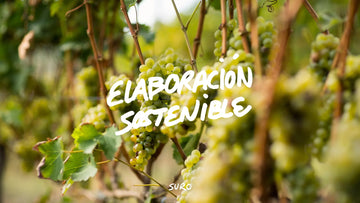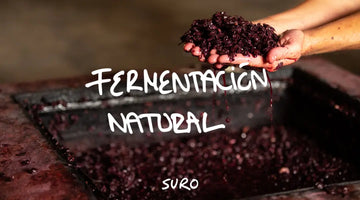In four words:
Natural wine is a type of wine made from organic or biodynamic grapes harvested by hand, and with minimal intervention by the winery.
Overview
In the last twenty years, an increasing number of winemakers have not only switched to organic and biodynamic farming, but have also adopted a different approach to winemaking: natural winemaking. It should be noted that for some producers, natural winemaking has always been the only option: some of them have always made wine naturally.
Natural winemaking has become a movement akin to a revolution, a nemesis of the industrialization and homogenization of wine in the last three decades. Natural winemakers are at the forefront of this movement, rejecting industrial winemaking techniques and the excessive use of pesticides, fungicides, herbicides or fertilizers in the vineyard.
Natural winemakers also reject the homogenization of flavor and the dominance of international grape varieties, preferring instead indigenous varieties and focusing on the concept of terroir.
Natural wine remains somewhat of a mystery despite its recent rise in popularity. Here we will try to explain what natural wine is and comment on some misconceptions.
main features
- Natural wines are made with minimal intervention in the cellar during the winemaking process.
- Natural wines are made with natural yeast; no industrial yeast is added to trigger fermentation or add a particular flavor to the wine.
- The fermentation process is not controlled by chemicals or temperature control devices.
- Sulfur dioxide, always in minimal quantities, is the only substance added to natural wines, serving as a stabilizer and preservative.
- Natural wines are often bottled unclarified and unfiltered and, as a result, sediment accumulates at the bottom of the bottle.
- Natural wines are made with grapes grown organically or biodynamically, although in some cases they are not certified.
- Natural wine producers tend to work with indigenous grape varieties.
Conventional oenology versus natural oenology
To better understand what natural winemakers are up against, it is essential to take a look at some of the most common substances and techniques used in conventional winemaking:
- Laboratory grown yeasts
- Antimicrobials
- antioxidants
- Acidity regulators
- Jellies filtering
- Clarifiers such as egg white, casein, isinglass
- Treatment of electric fields
- Gas injections to aerate the wine
- Reverse osmosis technique to control the alcohol-fruit juice ratio.
- Temperature control
natural wine vs. Organic wine vs. biodynamic wine
Not all organic or biodynamic wines are also natural wines, but instead all natural wines are made from organically or biodynamically grown grapes.
There is no shared definition or rule that establishes what a natural wine is, but there are well-defined regulations for what can be considered organic and/or biodynamic.
How does natural wine taste? How does it look like?
Natural wine can taste very different from other types of wine. In some cases, it has an acidity level comparable to that of a Belgian-style sour beer or even Kombucha. Natural wines are rarely aged in new oak and thus tend to be less round and supple; and tend to have less alcohol.
Natural wine is usually unrefined or unfiltered and therefore can appear cloudy, definitely cloudier than standard wine (more noticeable in whites). For some people, natural wine is funky, wild and unpredictable; for others, including us, it is precisely that, wine.
Why should you try natural wine?
Although it is true that natural wine may not be for all tastes, we believe that everyone should try it. And it is that natural wine can have a very different flavor from traditional wine and, in any case, it is a very interesting and potentially transformative experience.
As with other (non-natural) wines, there are good and bad natural wines; Natural wines well made and others defective. However, natural wines are by definition more ethical. In Bebedistinto you will only find those natural wines that we have tasted, and that we firmly believe deserve to be known.
Is natural wine healthy?
Decades of scientific research tell us without a doubt that wine contains substances that, if eaten in moderation, have beneficial effects. However, it would be irresponsible and unscientific to say that wine - natural or not - is good for your health.
We are clear that, above all, we are talking about an alcoholic beverage, and alcohol, especially in excess, is not good for health. We think it's a brutal drink, yes, but it should be consumed responsibly, in moderation, whenever possible accompanied by food, and of course with friends and family.
Is natural wine free from headaches?
Again, it would be irresponsible to make such a claim, and for two very simple reasons:
- There is no scientific evidence that sulfites cause headaches. Wine-related headaches are in fact very subjective and can be due to a wide range of factors, not just sulfites.
- Natural wines contain sulfites even if they are not added: sulfites form naturally during the winemaking process. There is no wine without sulphites.
However, it is true that natural wine has an incredibly low amount of sulphites and, therefore, for those who are very sensitive to sulphites, or even slightly intolerant, it is the best option on the market.
conclusion
Natural wine is probably the most fascinating wine on the market. He can be funky and wild, but not only is that not a bad thing, but he always shows a strong personality. But, in addition, with natural wine, each vintage is different, and has a different flavor, and that makes it even more exciting.
The non-interventionist winemaking approach, together with the best organic and biodynamic practices in the vineyards, give wines of unique character.





